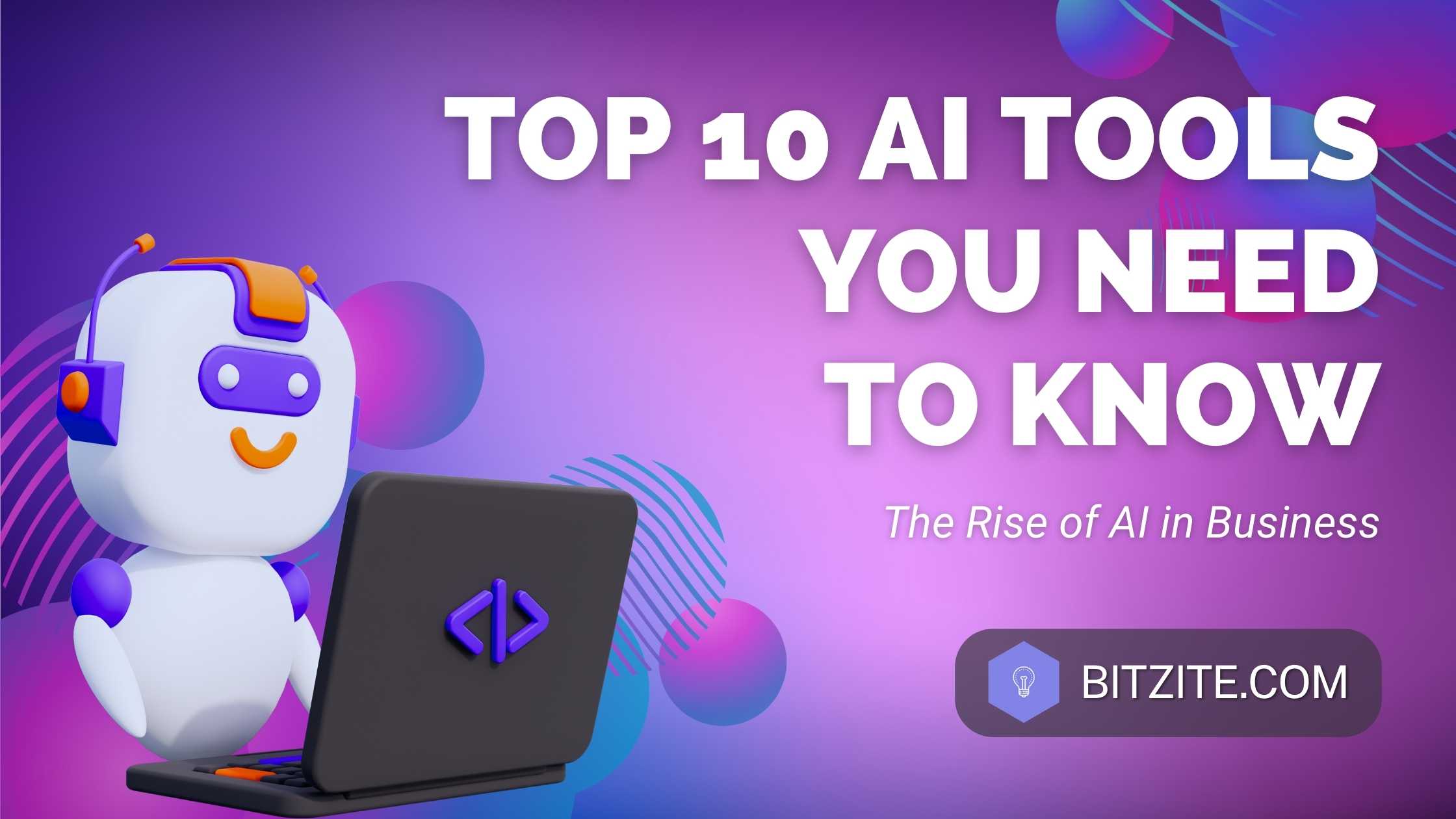Have you ever considered the immense potential that AI could provide for your organization? By performing mundane tasks automatically and providing insightful data, AI is transforming the way in which businesses operate. However, the abundance of available tools can make it difficult to determine which ones are most suitable for a given business. Your concerns have been resolved. This article provides an exhaustive list of the ten most important AI tools that you should be familiar with. We cordially invite you to unwind and allow us to provide you with an insightful exploration of the dynamic realm of AI in
Productivity and Efficiency
An important advantage of implementing AI tools in the workplace is the increase in productivity and efficiency. As enterprises expand and their operational intricacies escalate, it becomes imperative to identify methods for optimizing processes and eliminating labor-intensive duties. AI could be instrumental in accomplishing these objectives.
Consider the instance of avatars. 24/7, these AI-driven virtual assistants are capable of handling consumer inquiries and delivering instantaneous responses. Organizations can allocate their personnel to more crucial responsibilities by implementing automation in customer support. Furthermore, chatbots have the capability to amass significant customer data, thereby enabling enterprises to acquire profound understandings of customer inclinations and behavioral tendencies.
Robotic process automation is an additional potent AI method for improving efficiency. Repetitive and rule-based duties, such as data entry and report generation, are automated by this technology. By implementing RPA, organizations can decrease errors, streamline processes, and reallocate personnel to more strategic positions.
Personalization and Customer Experience
In a fiercely competitive business environment, it is critical to deliver a customized and exceptionally captivating customer experience. The potential of AI tools to personalize products, services, and marketing strategies for specific consumers is enormous.
Recommendation engines that are propelled by AI have the capability to examine extensive volumes of customer data in order to propose pertinent products or content that align with individual preferences. Increasing the degree of customization not only improves consumer contentment but also escalates the probability of generating revenue.
In addition, sentiment analysis tools utilize natural language processing (NLP) in order to examine the sentiment of customers across multiple platforms, including social media and online reviews. Businesses can enhance customer relationships, reinforce product or service quality, and promptly resolve concerns by gaining an understanding of customer sentiment.
Decision Making and Data Analysis
Businesses are compelled to leverage the potential of big data in order to facilitate well-informed decision-making and attain a competitive advantage. Alienware is capable of processing enormous amounts of data and extracting insightful information to inform strategic decisions.
For instance, machine learning algorithms have the capability to forecast future trends and demand patterns through the analysis of past sales data. Businesses can achieve cost savings, maximize customer satisfaction, and optimize inventory management through the implementation of precise demand forecasting.
Further, data analytics tools propelled by artificial intelligence have the capability to reveal latent patterns, correlations, and anomalies present in datasets that might elude human analysts. These insights can assist organizations in recognizing potential opportunities, minimizing risks, and executing data-driven decisions immediately.
Job Transformation and Automation
While AI tools increase productivity and efficiency, they also generate apprehension regarding the trajectory of employment. There is widespread concern that AI will supplant humans in a variety of roles. In actuality, AI is more likely to bring about job transformations than complete career eliminations.
Menial and repetitive duties can be handled by automation tools powered by AI, enabling personnel to concentrate on more intricate and innovative endeavors. As an illustration, personnel can allocate their time towards strategizing and data analysis rather than pentiring away hours manually compiling reports when employing data analytics tools propelled by artificial intelligence.
AI can also revolutionize occupations through the enhancement of human capabilities. For example, AI-enabled assistants can assist professionals in data analysis, research, and decision-making by furnishing them with up-to-date information and suggestions that enable them to make more knowledgeable judgments.
Ethical Deliberations and Responsibility
The increasing integration of AI into business operations gives rise to significant ethical concerns. Despite their advanced capabilities, AI tools remain human-programmed and may acquire prejudices or discriminatory tendencies from the training data. This may give rise to substantial social and ethical ramifications.
Organizations that implement AI tools are obligated to guarantee accountability, transparency, and impartiality in their algorithms and decision-making procedures. Through consistent surveillance and auditing of AI systems, organizations can detect and correct any errors or biases. Organizations must also establish distinct codes of ethics and guidelines for the application of AI in order to guarantee its ethical and responsible deployment.
Conclusion
AI tools have evolved into essential components in the contemporary business landscape, providing an array of advantages including enhanced productivity, customized solutions, data exploration, automated processes, and workforce revolutionization. Nevertheless, it is critical to exercise prudence when utilizing these tools and to bear in mind the ethical implications that they entail. Through the responsible and ethical utilization of AI, organizations have the ability to fully exploit its capabilities and attain a competitive advantage in the marketplace.
